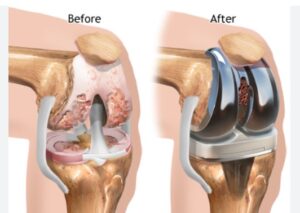
Knee replacement surgery can be a life-changing procedure for those suffering from debilitating knee pain and limited mobility. However, the journey to recovery can be daunting, especially for individuals facing financial challenges or uncertainty about their ability to work post-surgery. In such cases, understanding the availability of Social Security Disability (SSD) benefits can provide crucial support and peace of mind throughout the rehabilitation process.
Let’s explore how SSD benefits can help individuals undergoing knee replacement surgery.
Understanding Knee Replacement and Disability
Knee replacement surgery, also known as knee arthroplasty, is often recommended for individuals with severe arthritis or a significant knee injury that impairs their ability to perform daily activities. While the procedure aims to improve functionality and alleviate pain, the recovery process can be lengthy, requiring physical therapy, rehabilitation, and temporary or permanent modifications to work activities.

For some individuals, the recovery period may extend beyond what is possible for them to continue working in their earlier role, leading to a loss of income and financial strain. In such cases, Social Security Disability benefits may provide crucial financial support to help cover living expenses and medical costs during the recovery phase.
Six things to know about recovering from knee replacement surgery.
Qualifying for SSD Benefits
To qualify for SSD benefits, individuals must meet the Social Security Administration’s (SSA) eligibility criteria, which include the following:

- Eligibility: The individual must have a medically proven condition that meets the SSA’s definition of disability. This means the condition must be severe enough to prevent them from engaging in substantial gainful activity (SGA) for at least 12 months or result in death.
- Work Credits: Applicants must have worked in jobs covered by Social Security and earned enough work credits to be eligible for benefits. Work credits are earned based on annual income, and the number needed depends on the individual’s age at the time of disability onset.
- Duration of Disability: The disability must be expected to last for at least 12 months or result in death.
How Knee Replacement Surgery Factors In
Knee replacement surgery can significantly affect an individual’s ability to work, particularly if their occupation involves physical labor or requires prolonged periods of standing or walking. The SSA considers the functional limitations caused by knee replacement surgery when evaluating disability claims.
Factors that may influence the SSA’s decision include:
- Severity of Impairment: The extent to which knee replacement surgery affects the individual’s ability to perform work-related tasks, such as walking, standing, bending, or lifting.
- Recovery Prognosis: The expected duration of recovery and rehabilitation after knee replacement surgery, and any anticipated residual functional limitations.
- Documentation: Comprehensive documentation from your physician(s), including surgical reports, imaging studies, treatment records, and physician assessments, is essential to support the disability claim.
Benefits of SSD for Knee Replacement Recovery
Securing SSD benefits can provide several crucial advantages for individuals undergoing knee replacement surgery:
- Financial Support: SSD benefits offer a source of income to cover living expenses, including housing, utilities, groceries, and bills, during the recovery period when individuals may be unable to work or earn income.
- Access to Healthcare: SSD beneficiaries may be eligible for Medicare, the federal health insurance program for individuals aged 65 and older, or those with qualifying disabilities. Medicare coverage can help offset the costs of postoperative care, rehabilitation services, and recovery equipment.
- Peace of Mind: Knowing that financial help is available can alleviate stress and anxiety associated with loss of income and uncertainty about the future, allowing individuals to focus on their recovery and rehabilitation efforts.
Conclusion: Navigating Knee Replacement Recovery with SSD Benefits
Knee replacement surgery is a significant step towards improved mobility and quality of life for individuals with debilitating knee conditions. However, the recovery process can present challenges, particularly for those facing financial difficulties or unable to work due to their condition.

Applying for and obtaining SSD benefits for knee replacement surgery can be confusing, frustrating, and overwhelming. Why not allow a law firm that only practices disability law to help? The legal team at Parmele Law Firm has 135+ years combined years of SSD experience and has helped over 55,000 individuals receive the disability benefits they so rightly deserved. Contact us today to schedule your no-cost consultation. What have you got to lose?
Parmele Law Firm. Guiding you with integrity, competency, and experience.
